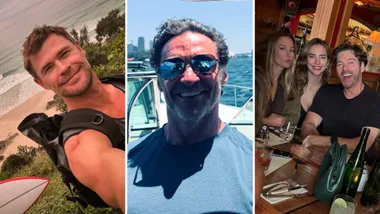Exclusive extract fromShearwater(Viking) by Andrea Mayes.
In that place, the birds come and go in great clouds, and the season turns at the rush of grey wings. Through spring and summer dusk falls to their rhythm, and in the winter, the land is bereft, hushed and waiting for their return. These are the shearwaters, mutton-birds, of which the early settlers were so fond. Drab little birds, with sprits of tenacity and endurance, and other characteristics that some have found endearing.
They fly halfway round the earth to reach their coastal breeding grounds, returning to the same burrow every year. They mate at sea, mate for life, and lay only one precious egg each season. They cover hundreds of kilometres each day searching for fish. In sight of land they call loudly and frequently but at sea they are silent. Why? The human mind hungers for explanations even as the stomach yearns for diversity. Shearwaters were once hunted to the point of extinction when settlers discovered that the meat, arriving so promptly each September, was a pleasant change from their staple diet of mutton. Being an object of endearment isn’t always what it’s cut out to be.
She packs. Emptying drawers, stuffing clothes into bags, loading up the car. A part of her mind thinking of these things. A sharp little voice. She listens. It seems to know what it’s doing. Take this, for comfort. And this. Better grab those too; you don’t know how long it will take. She checks the credit cards in her wallet, stuffs the chequebook into her pocket, finds her passport. Identity. You might need to prove who you are. What a strange and skittering through that is. She looks inside at the photograph. Cassandra Callinan. Yes.
I’m 54 years old. Where can I go? What am I good for? I am expert at dinners that keep without spoiling.Sorry, Cassie, it’s this damned Oreka business. Don’t wait up for me.Or it was the South Australian deal, or the Minnie Brothers, or Cassek, Reicher and Hardy versus … Sometimes he didn’t come home at all.
I am addicted to crime shows and the solace of a scotch, or two, but I still draw the line at reality TV. You have to have standards. How else to define yourself?
Did they go to a hotel, or to her place? Is their bed anonymous, or familiar and warm, retaining the scent of their bodies between meetings? How often do they …? She closes her eyes. I’m in the wrong story. I have been so careful. This was never, ever meant to happen to me.
She remembers to fill the petrol tank and stocks up on cash. Then she’s heading south on the highway. Driving fast. Anywhere. Away. Soon the city looms on her right and she’s soaring up over the docks on the wide span of the bridge, driving, driving, and nothing makes sense. Flying along a curving cliff-top road, unmoved by immaculate vistas of sun-flecked waves, she is provoked by yellow warning signs of a 25km/h speed limit. Feels the engine roar in her blood, sees the car shoot across the road, dissolving barriers, soaring silver into wide blue sky.
“It wouldn’t be like that,” she mutters desperately. Wonders how much blood and spattered gore, how prolonged the pain, and what certainty of death?
“One potato, two potato, three potato, four,” she chants, and bites her lip to stop it. Fear keeps her in the lane, as it always has. She drives for hours, the world a blur until by chance she sees the sign for Shearwater. Flickers of childhood. Summers long ago, travelling this south-west coast road on camping holidays with her parents and younger brother, Stuart. Damp canvas and spitting bacon, salt winds and seaweed and sunburn lotion. She swings the wheel at the last minute, earning a blast of disapproval from a huge Mack truck, and takes the turn-off. She’s taken Richard’s Mercedes-Benz too, gathering up, more from habit than from any hope of a future, whatever scraps of solace come her way. She cruises down the main street, looking for signs of anything familiar. I don’t remember this. It’s all so different. My hands are trembling. I ought to find something to eat. When did I last eat? Was it lunch at school, before … before.
She parks. Walks over to the Post Office & General Store and sees a card taped to the glass. ‘Peaceful, secluded furnished cottage for rent.’ It might as well have her name on it. She catches sight of herself in the shop window. A plump, motherly woman with a frizzy halo and a worried face. A well-cut brown jacket. Expensive leather bag hanging from one shoulder, the strap too long, the bag too full and bulging.
A bell rings as she pushes open the door and a voice descends from the ceiling.
“Hello? Won’t be a tick. Martin! Martin! Can you mind the shop? I’m up the stepladder. Martin? Oh! He’s never around when you need him, that man.”
A short round woman negotiates the rungs of a ladder with tiny slippered feet. Safe on the ground, she gazes upwards, one hand on her chest as though to calm the effects of altitude.
“Is it straight, do you think?” Her face is flushed. Little black eyes framed in a triangle of nose, pouched brow and cheek, like a melancholy puffin.
Together they stare at a pyramid of baked beans on a high shelf. Cassie makes a mental note not to slam the door on her way out.
“It will have to do,” the woman says. “You only just caught us. We’re finishing up for the day. But here I am, keeping you waiting. Pity the weather’s turned poor, isn’t it? Never known such a wind, not even here, and we’re used to gales. What can I help you with?”
“The cottage. I’d like to rent the cottage, please.”
Book Group questions
Should Cassie have been more assertive and stayed and fought for her marriage and fair share of their belongings?
Has Richard made a giant mistake that he will live to regret?
After the first few strange incidents at the cottage, why doesn’t Cassie flee?
Is Cassie a much different person by the end of the book and will she find happiness?
Was Kit’s acceptance of a fee from Richard to keep an eye on Cassie unethical or understandable given his age and situation?











